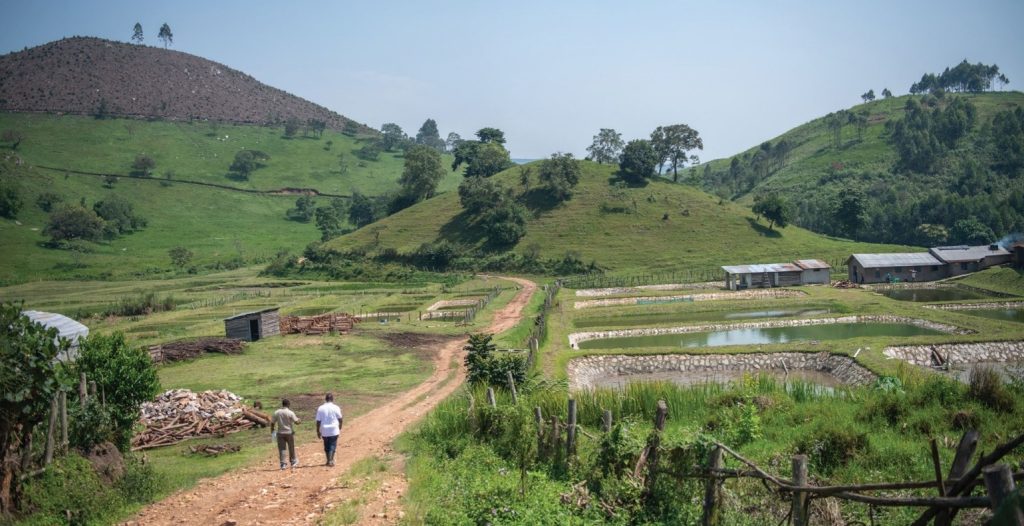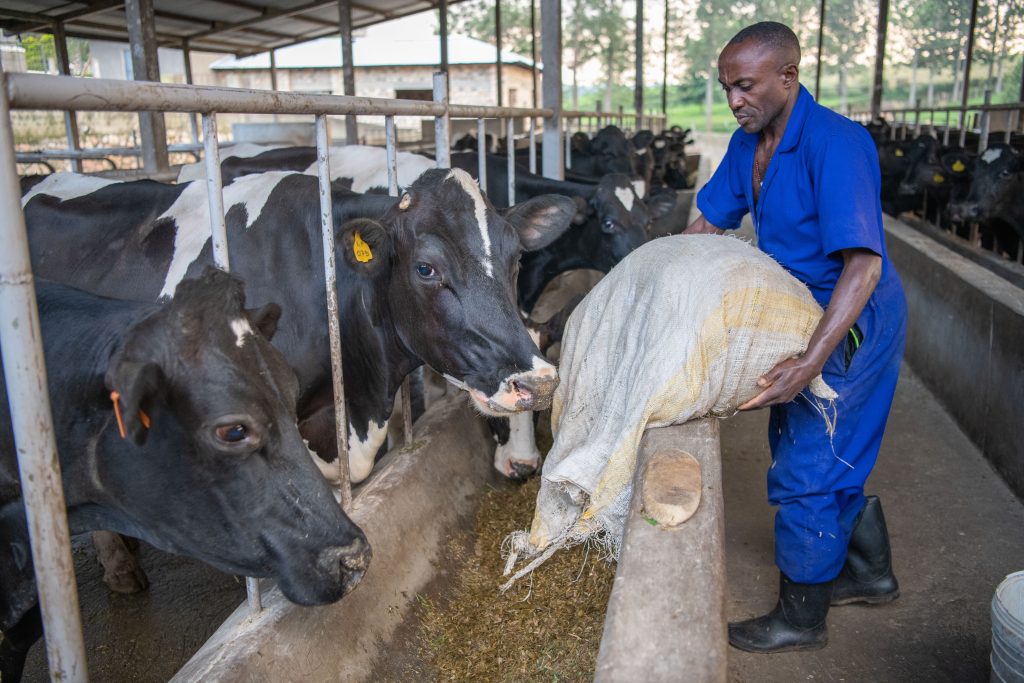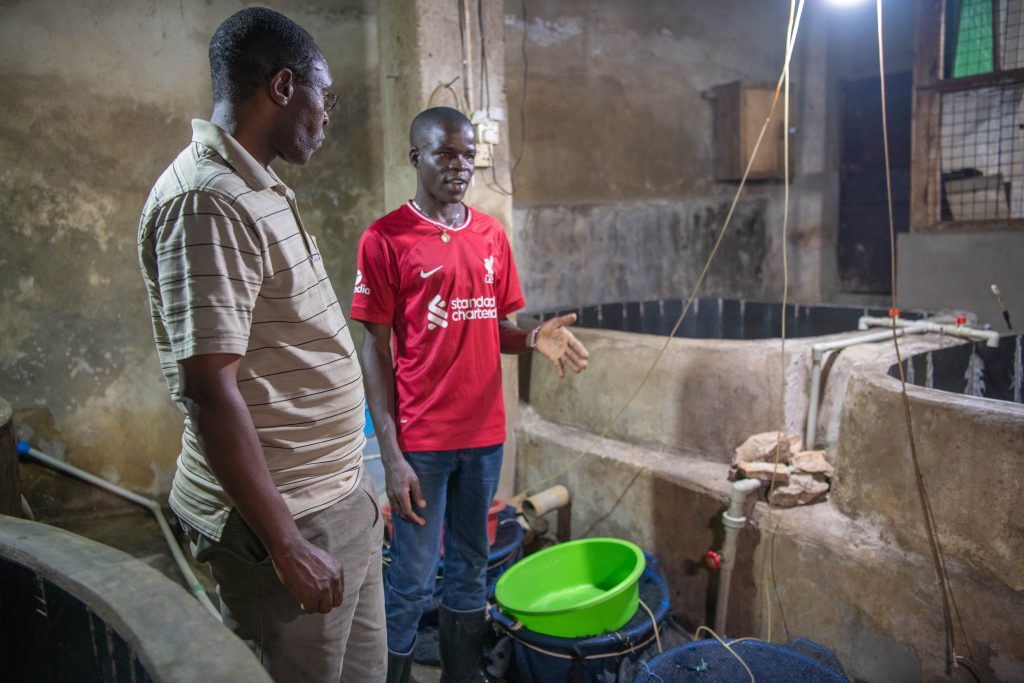Click here to download the story as a pdf


Kabeihura Farmers Limited, or KFL, is a fast- growing and multifaceted family-run farming operation located in the district of Bushenyi, in southwestern Uganda. According to Eriab Muhozi, Kabeihura’s founder, the farm was created in 1975 on 20 hectares of land devoted to cultivating tea. Since then, the property has grown to include dairy, poultry and fish production, as well as 40 hectares of eucalyptus forest.
As the operations expanded, the farm needed support with managing their products and keeping track of their business. Beginning in 2019, Kabeihura has hosted six volunteer assignments through the U.S. Agency for International Development’s Farmer-to-Farmer, or F2F program.
Each assignment has allowed the farm to grow in new ways—including expanded business accounting, healthier livestock and value-added products.
When F2F assignments first began, Kabeihura Farm had been importing costly fish feed from Europe and wanted to learn how to make their own feed. There were other issues to tackle as well—including the 20-30% mortality rate among their catfish and tilapia, and a need for bigger fish. “We had been reading in textbooks that you can produce a 1-kilogram fish in six to eight months, and we had not obtained it,” says Imelda Muhozi, co-owner of KFL.
Enter F2F volunteer and aquaculture expert Joseph Sullivan, who helped the farm staff identify local ingredients and formulas to produce their own fish feed as well as introducing new techniques for proper fish handling.
One new technique he taught was to handle the fish with wet hands to decrease the mortality rate of the fish. He also began feeding methyltestosterone— a male hormone—to newly hatched tilapia, ensuring they grow into large male fingerlings which are the most profitable. Now, the ability to produce bags of male-only fish has helped KFL create a niche market with Congolese customers, who purchase over 10,000 fingerlings per month, earning the farm an additional $833 each month.
In addition, Kabeihura was able to win a contract to supply fingerlings to National Agricultural Advisory Services, a Government of Uganda project under the Ministry of Agriculture, Animal Industries and Fisheries.
Improved processes have resulted in better profits, lower fish mortality and more efficient use of time. Since this assignment, KFL has supplied 300 smallholder farmers with fingerlings and trained 70 fish farmers. KFL’s success has also impacted others. Another local hatchery has started using the sex reversal process, showing how the procedure has the potential to transform the hatchery industry in southern Uganda. In turn, Ranaan Foods, one of the few methyltestosterone suppliers in Uganda, could see sales rise as the sex reversal practice becomes known in the fish farming community. “Business prospects look bright with the ability to compete at a national level due to new and world class products,” says Isaac Muhanguzi, KFL’s director and operations manager. “I see this as a fundamental change in our business.”
“We are more competitive because we have a variety of products for customers to choose from,” he says. “Our farm will grow as our sales grow. And once the sales grow, then other areas will be developed.”
—Isaac Muhanguzi, KFL’s operations manager(pictured right)
Throughout 2022, KFL hosted a number of volunteer assignments that continued to impact their business. Two assignments focused on improving livestock nutrition. With improved poultry feed, KFL experienced an increase in both egg production and the quality of the eggs, particularly the yolks. Another F2F assignment concentrated on dairy nutrition and included instruction for making feed, silage, salt licks and how best to fertilize Napier grass and other grasses and legumes to maximize yields by putting the manure in trenches and weeding regularly. In addition, emphasis was put on planning for the entire livestock on the farm depending on the livestock units available and projected in the next year.
In late 2022, a second dairy-related F2F volunteer assignment paired local volunteer, Allan Nkinzehiki with U.S. volunteer Dave Blomquist to assess milk handling and make recommendations on value-added dairy products, specifically yoghurt and ice cream. The volunteers audited and made several recommendations for best practices for the current yoghurt processing procedure, including milk handling, processing, packaging, storage, troubleshooting, quality control and transportation.
Finally, two F2F assignments in October of 2022 focused on the business side of Kabeihura Farm. U.S. volunteer Bob Cooperrider and local volunteer Kasaijja Tom Muganzi trained four members of KFL’s finance staff in the basics of accounting to empower them to utilize Tally.ERP 9 accounting software. The pair reviewed basic accounting terms, principles and concepts and bookkeeping. During a second assignment, they also trained the staff to utilize Tally.ERP 9 software to efficiently handle financial and accounting operations, a key for decision making. In addition, the volunteers showed staff how to ensure timely entries, capture and post business transactions, and create tax returns. They also created a manual for use by future employees.
Isaac is thrilled by the farm’s prospects. “We are more competitive because we have a variety of products for customers to choose from,” he says. “Our farm will grow as our sales grow. And once the sales grow, then other areas will be developed.”
“We appreciate the service we get from Farmer- to-Farmer,” he adds. “Learning is a continuous process. We don’t mind having teachers. You keep learning until you die.”



The CRS F2F program is a USAID-funded program focused on reducing hunger, malnutrition, and poverty across six countries: Benin, Timor-Leste, Ethiopia, Nepal, Rwanda, and Uganda. The program runs from 2018-2023 and aims to generate sustainable and broad-based economic growth in the agricultural sector. U.S. volunteers with agricultural expertise share skills and help build capacity for farmers through short-term training and technical assistance projects resulting in more productive, profitable, sustainable, and equitable agricultural systems.
Photos by Holly Powers/CRS